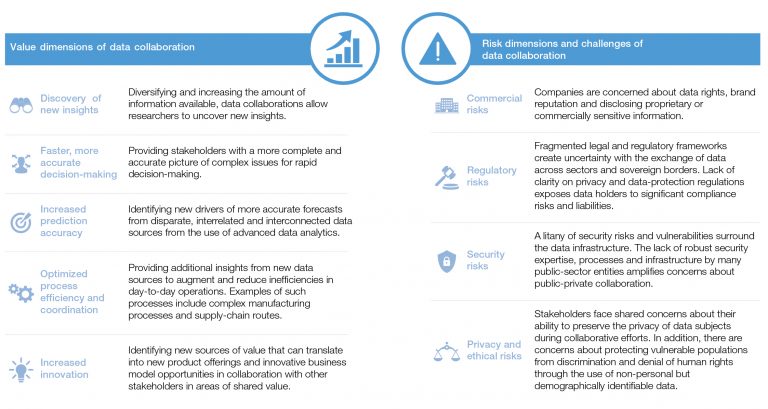5 Ways That Data Collaboration Can Grow Your Business
Data collaboration between enterprises is essential for sustainable growth in the digital era, especially for companies that routinely rely on big data to inform business practices but have exhausted their internal data silos.
For the savvy businesses that successfully leverage actionable data in their ecosystem, the upside of inter-organizational collaboration is undisputed, yielding revenue and cost-saving opportunities that are aggregately valued at an astonishing 3 trillion annually.
The concept of collaborative, data-driven ventures between companies is not a new phenomenon, nor is it confined to any specific industry verticals. American Airlines and Citi, for example, have been sharing customer information for over thirty years to increase customer loyalty and boost credit card spending. More recently, companies like Foursquare have successfully monetized mobile location data to help apps like Accuweather and TripAdvisor enhance user experience by delivering highly accurate and personalized results.
DETERRENTS TO COLLABORATION
Despite the far-reaching benefits of data collaboration, unbridled or improper use of sensitive information and user data in particular, can badly undercut a company's bottom line. Hacks and data leaks can result in:
- Hefty regulatory fines
- Steep legal fees
- Reputational damage
- Internal security costs to rectify breaches
- Lost opportunities for profit generation
FINANCIAL AND REPUTATIONAL RISKS
According to a recent report by IBM, the average cost of a data breach in 2019 was $3.9 million. However, for major enterprises, the stakes are substantially higher both in terms of financial costs and reputational damage. Equifax, a large credit reporting agency, felt the wrath of regulators following a massive security breach that landed the corporation with a $650 million regulatory fine. Beyond the record penalty of $5 billion Facebook paid for its role in the Cambridge Analytica data breach, it is still dealing with considerable scarring to its brand.
Balancing the value and risk dimensions of data collaboration, as summarized by the World Economic Forum in the chart below, is no easy task.

Source: World Economic Forum Insight Report, Data Collaboration for the Common Good
PET PROVIDES A SECURE ALTERNATIVE TO OPEN DATA SHARING
Fortunately, a new family of advanced cryptographic techniques, collectively known as Privacy-Enhancing Technology (PET), can facilitate secure data collaboration between enterprises without requiring participants to share sensitive information.
PET has received broad recognition as a very timely phenomenon, particularly in light of tightening regulatory constraints from a data privacy perspective. Recently, The European Data Protection Supervisor (EDPS) heralded PET as an "enabler of data sharing which is both privacy-friendly and socially beneficial" that is "crucial for the next stages of the data economy." The next stages of the data economy, as put by the EDPS, will see businesses empowered to leverage third-party data while retaining ownership over confidential information and upholding regulatory compliance.
5 WAYS YOUR COMPANY CAN BENEFIT FROM DATA COLLABORATION
Given the new frontier for inter-organizational data collaboration enabled by Privacy-Enhancing Technology, let's review five ways that data collaboration can help your business create new revenue and cost-saving opportunities:
1. Maximizing partnerships: Nurturing business partnerships is essential for robust commercial growth, but promoting joint business initiatives with a "pray and spray" marketing approach rarely delivers cost-effective or optimal results. Identifying and segmenting overlapping customers is a great way for companies to coordinate customer engagement, launch targeted ad campaigns, and inform strategic business decisions around the co-development of new products.
2. Optimizing supply chain management: Independent distributors and online sellers who rely on suppliers with contentious creditworthiness absorb unnecessary supply chain risk, especially during an economic downturn. Cross-referencing the names of suppliers against supplier blocklists in your ecosystem is one way to avoid problematic relationships. Data collaboration can also help you verify the production capacity of a manufacturer or reveal other businesses in close proximity who work with your supplier, enabling you to pool shipments and save on delivery costs.
3. Detecting financial fraud: As criminal networks become increasingly sophisticated, financial institutions and insurance providers that refrain from sharing records with their ecosystem are exposed to a higher risk of fraud. Indeed, the Financial Action Task Force (FATF) and the Financial Conduct Authority (FCA) have both identified information-sharing as one cornerstone of a well-functioning AML/CFT framework. Sharing intelligence can help you detect duplicate use of receivables for financing, as well as cases in which the same insurance claim is submitted to multiple carriers. It can also help you enhance Know Your Customer (KYC) processes and identify new risk indicators.
4. Curbing fake accounts and stolen identities: Insurance companies that are unable to verify personal identity information (PII) against databases maintained by other organizations have difficulty detecting identity fraud. Corroborating the consistency of PII and being alerted when discrepancies are found provides extra assurance that your customers are who they say they are.
5. Avoiding regulatory fines: Banks and other financial institutions that service clients who are bound by tax authorities in multiple jurisdictions can face significant regulatory penalties for failing to make the proper disclosures. Comparing taxable sources of income for individual accounts across a financial ecosystem can help ensure that your organization has the full picture when it comes to tax reporting and compliance.
As noted above, data collaboration can directly translate to increased revenue, cost-savings and risk mitigation for your business. QEDIT offers a secure data collaboration platform, powered by Privacy-Enhancing Technology, so you can gain valuable insights from your ecosystem without relinquishing data ownership or violating privacy regulations.
Contact us directly to learn more about how QEDIT can help you securely leverage partner and client data to grow and protect your business.